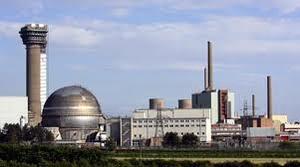Nuclear scareMen arrested outside U.K. largest nuclear plant, then released
Five young men of Bangladeshi origin were arrested outside Sellafield, the U.K.’s largest nuclear facility hours after President Obama announced the killing of OBL; the men were arrested for taking pictures and behaving suspiciously (the Civil Nuclear Constabulary said that the men were “unable to give a satisfactory account of their actions”); after being questioned the men were released as it appears that they had taken a wrong turn; the men told police they were traveling along the road only because their in-car satellite navigation system had taken them the wrong way on the remote road just off the coast of Cumbria, close to the Lake District; Sellafield is one of only four nuclear fuel reprocessing plants in the world

Sellafield nuclear reprocessing facility // Source: gobeyondoil.com
Five men of Bangladeshi origin, all in their 20s, were arrested outside the Sellafield nuclear plant in Cumbria, United Kingdom, after Civil Nuclear Constabulary (CNC) officers spotted them taking pictures of the facility. The CNC said that the men were arrested after they were “unable to give a satisfactory account of their actions.”
The BBC reports that the men were held for a few hours for questioning under Section 41 of the Terrorism Act. The five men were from Romford, Essex, more than 250 miles from the nuclear facility. As part of the investigation, five houses were searched and a small container was removed from one of them. The police would not say what was in the container.
The arrests were made within hours of the announcement by President Barack Obama of the killing of Osama bin Laden, but the Greater Manchester Police (GMP) said in a statement that “At this stage we are not aware of any connection to recent events in Pakistan.”
The men were released late Monday without charges being filed as it emerged that they had taken a wrong turn. The Guardian reports that the men told police they were traveling along the road only because their in-car satellite navigation system had taken them the wrong way on the remote road just off the coast of Cumbria, close to the Lake District.
The BBC notes that the Sellafield facility is used for decommissioning and reprocessing nuclear waste and fuel for the Nuclear Decommissioning Authority. The site has been in operation since the 1940s, and it is heavily guarded by both private security and officers from the Civil Nuclear Constabulary.
Ian Farnan, a leading expert on nuclear power at the Department of Earth Sciences at Cambridge University, described security at Britain’s nuclear plants as robust. He told the Christian Science Monitor that “It would be a really hard job to take on one of these power plants,” he said. “A far easier way to distribute nuclear material would be to procure it abroad, perhaps the former Soviet Central Asia, and bring it into the country. You could then take that into the center of a city.”
As for breaching the security of Europe’s nuclear reactors, Dr. Farnan, who worked as part of a NATO group set up to analyze security at Britain’s nuclear plants back in 2003, believed it was unlikely to occur. “The big concern back then, not long after 2001, was aircraft,” he told the Monitor. “The reactor is inside a hardened concrete structure. It’s so thick it’s unlikely to be penetrated by an aircraft. So if you’re looking at dispersal of nuclear material as your objective, that’s not what you’re going to do.”
In the aftermath of 9/11, the NATO group had also looked at the idea of a suicide attacker, said Farnan. “We came to the conclusion that in order to get to the radioactive material you would have to be more than a suicide bomber, you would have to be a suicide commando, someone with the know-how to get far enough into the facility to get access to the nuclear material.” The possibility of such an attack was very remote, he said.
Sellafield is the largest nuclear facility in the United Kingdom, and it is one of only four nuclear fuel reprocessing plants in the world. The BBC says it the facility has a bunker that stores about 100 tons of plutonium, which experts say is enough to manufacture thousands of nuclear weapons.
